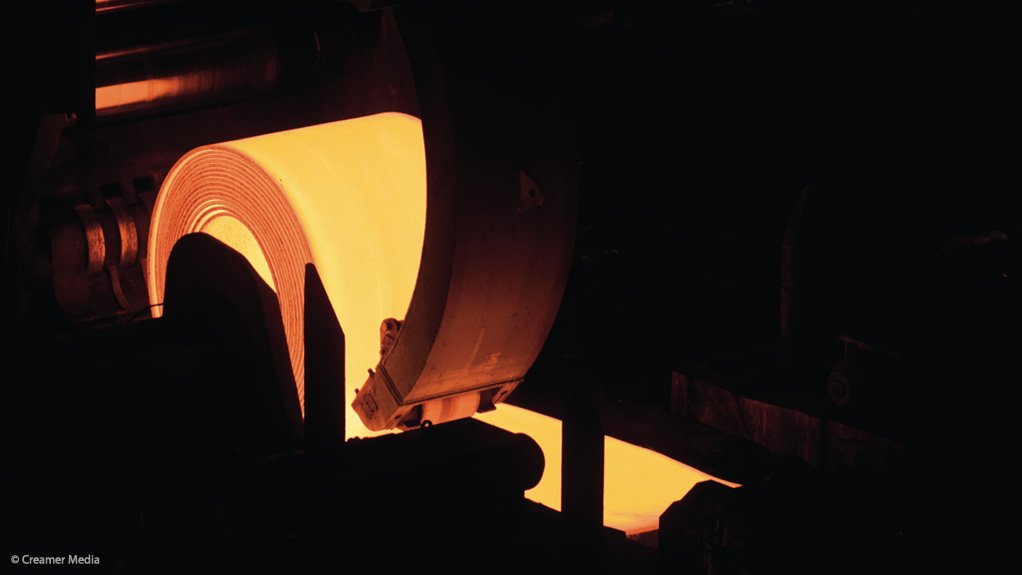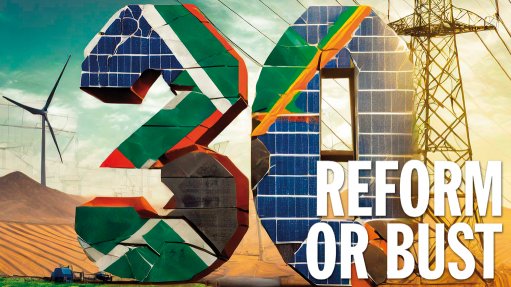Steel supply squeeze continues for downstream firms
South Africa’s downstream fabricators and manufacturers are continuing to experience difficulties in securing steel and are also confronting rising prices, which could be partly attributed to the throttling of supply over the past few months.
The Department of Trade, Industry and Competition (DTIC) is currently conducting a survey of steel consumers to assess the state of supply and the department’s Umeesha Naidoo tells Engineering News that responses have already been received from a number of merchants, re-rollers and downstream companies.
Naidoo says the feedback indicates that flat steel and heavy long steel products remain affected and says the disruptions and shortages are a global problem, arising from the lockdowns instituted to contain the Covid-19 pandemic.
The problem in South Africa has been exacerbated, though, by the closure of ArcelorMittal South Africa’s (AMSA’s) Saldhana Steel plant, as well as delays in returning a second blast furnace at AMSA’s Vanderbijlpark mill to service and production difficulties experienced at the group’s Newcastle mill towards the end of 2020.
Southern African Institute of Steel Construction (SAISC) CEO Paolo Trinchero tells Engineering News that all grades of hot rolled coil (HRC) are affected together with various long products, including heavy beams and columns from the Highveld Steel plant, which processes billets supplied from AMSA.
The supply squeeze is described by some as extreme, with Unique Ventilation and Support Systems (UVSS) director Ollie Olevano reporting that, had it not been for the receipt of an import consignment in December, the company would have been forced to shut production and declare force majeure.
“Ninety percent of our products are supplied on contract with the mines and they are all critical for mining. It could force mines to curtail or even stop production,” Olevano tells Engineering News, indicating that the outlook for supply during the first quarter remains precarious.
PROTECTION QUESTIONS
UVSS’ frustrations have been compounded by the refusal of AMSA to approve a rebate against duties, despite an inability to supply steel on a reliable and regular basis.
Flat and long steel product imports into South Africa are subject to base tariff protection of 10%, but certain flat products are also subject to safeguard duties of a further 8%, resulting in overall protection of 18% on certain grades.
While rebates can be considered for steel not available in the domestic market, consumers have nevertheless struggled to secure these during the recent period of shortage and AMSA also has several further applications before International Trade Administration Commission of South Africa.
“To add to our aggravation customs have stopped our consignment for inspection and insisted on a R2.5-million payment to have material released,” Olevano laments.
Duferco Steel Processing MD Ludovico Sanges confirms that customers are “desperately” looking for steel and that the re-roller itself is also taking strain.
He reports that Duferco is still waiting for HRC ordered from AMSA in May, a delay which he attributes to both the closure of the Saldanha Works and the unreliability of AMSA’s other facilities.
Sanges believes the easing of import restrictions could assist in alleviating the supply squeeze and reports that Duferco, too, has requested a duties rebate, given AMSA’s inability to supply.
“If re-rollers, including Safal and Duferco, could get a HRC duties rebate, competition, product availability and additional jobs will be restored,” Sanges asserts.
SAISC’s Trinchero concurs that imports would help, but that these should come in duty free to relieve the backlog.
“Closer collaboration between the local mills, merchants and downstream could assist in prioritising the most critical items to reduce the backlog as soon as possible,” he adds.
That said, the situation is likely to improve in the coming months, with a number of imports scheduled to land in January and with AMSA moving to start a second blast furnace at Vanderbijlpark.
Allied Steelrode CEO Arun Chadha believes the “catch up” could happen by the end of March.
“We have had tremendous shortages for six months due to the inability of AMSA to fire Blast Furnace C. After our meeting with them, they started the blast furnace on December 18, and this is producing 3 000 t a day.”
The DTIC’s Naidoo reports that AMSA has confirmed with government that a second blast furnace has entered production and that it is starting to address the backlog in supply. “[But] we have also been informed that there are backlogs with imports coupled with increased freight costs.”
However, Olevano notes that customers are still “on allocation for quarter one” and that he has received concerning reports that the second blast furnace is not yet operating at capacity.
Chadha reports that his company has decided to back the retention of local steel capacity, arguing that local mills are important for the economy.
Tariffs, he adds, do not matter if AMSA sticks to its pricing policy. “As long as we all agree to support the local mill, who in turn keep their prices fair, the tariffs are only an academic way of deterring small guys from importing.”
Others are less supportive of AMSA, arguing that the market should be opened, and protection removed.
“Remove all duties and make steel more affordable and competitive,” Olevano urges, while Sanges argues that government should pay more attention to the hundreds of smaller steel companies that, together, employ far more people than AMSA.
Government, he argues, “still considers AMSA to represent the steel industry”.
“DTIC protects AMSA, which employs 7 000 people at the cost of 250 000 downstream earners and families in the steel industry,” Olevano avers.
PRICE WORRIES
Trinchero is also concerned about the outlook for pricing, noting that steel prices have increased significantly in the last few months, making the downstream industry less competitive against finished-product imports.
“To what extent these increases are a function of throttling the industry should be investigated,” he adds.
Sanges argues that the ‘basket price’ methodology used to set domestic steel prices excludes low-cost emerging countries and doesn’t take into consideration the export price.
Olevano adds that domestic prices have risen to high levels, which is resulting in product substitution and is placing domestic fabricators at a competitive disadvantage relative to imports.
“Local pricing is unfortunately driven by international pricing. Chinese steel has increased by $170/t in January 2021 . Iron-ore is at an all-time high and the South African steel industry no longer receives favourable pricing from Kumba. Electricity [the price of which has increased dramatically] is also a huge cost factor in steel making.”
MASTERPLAN PROGRESS
The DTIC’s Naidoo stresses that government is keen to develop an industry that is “competitive, dynamic and inclusive and which is able to provide a stable platform for investment, growth and job creation”.
To achieve this a ‘Steel Masterplan’ is being developed through engagements with industry across the steel value chain and the labour unions.
Several downstream stakeholders have provided feedback, Naidoo adds, emphasising the benefits of maintaining a primary steel industry, which range from quicker turnaround times, an ability to place orders in smaller quantities and the prospect of returning reject material.
“The loss of domestic capability and capacity will have a detrimental effect on the downstream industry as well as a negative impact on port capacity to handle imports. The temporary closure of Highveld Steel provides a lesson in that the imported price of heavy section steel was increased during the time that Highveld was unable to produce.”
In addition, the retention of a primary steel industry also ensures that some South African-mined iron-ore is beneficiated.
The draft masterplan was circulated to stakeholders for comment in October and ‘Version 1.0’ is currently being finalised and includes an implementation plan and the establishment of a Steel Council South Africa.
Comments
Press Office
Announcements
What's On
Subscribe to improve your user experience...
Option 1 (equivalent of R125 a month):
Receive a weekly copy of Creamer Media's Engineering News & Mining Weekly magazine
(print copy for those in South Africa and e-magazine for those outside of South Africa)
Receive daily email newsletters
Access to full search results
Access archive of magazine back copies
Access to Projects in Progress
Access to ONE Research Report of your choice in PDF format
Option 2 (equivalent of R375 a month):
All benefits from Option 1
PLUS
Access to Creamer Media's Research Channel Africa for ALL Research Reports, in PDF format, on various industrial and mining sectors
including Electricity; Water; Energy Transition; Hydrogen; Roads, Rail and Ports; Coal; Gold; Platinum; Battery Metals; etc.
Already a subscriber?
Forgotten your password?
Receive weekly copy of Creamer Media's Engineering News & Mining Weekly magazine (print copy for those in South Africa and e-magazine for those outside of South Africa)
➕
Recieve daily email newsletters
➕
Access to full search results
➕
Access archive of magazine back copies
➕
Access to Projects in Progress
➕
Access to ONE Research Report of your choice in PDF format
RESEARCH CHANNEL AFRICA
R4500 (equivalent of R375 a month)
SUBSCRIBEAll benefits from Option 1
➕
Access to Creamer Media's Research Channel Africa for ALL Research Reports on various industrial and mining sectors, in PDF format, including on:
Electricity
➕
Water
➕
Energy Transition
➕
Hydrogen
➕
Roads, Rail and Ports
➕
Coal
➕
Gold
➕
Platinum
➕
Battery Metals
➕
etc.
Receive all benefits from Option 1 or Option 2 delivered to numerous people at your company
➕
Multiple User names and Passwords for simultaneous log-ins
➕
Intranet integration access to all in your organisation





















